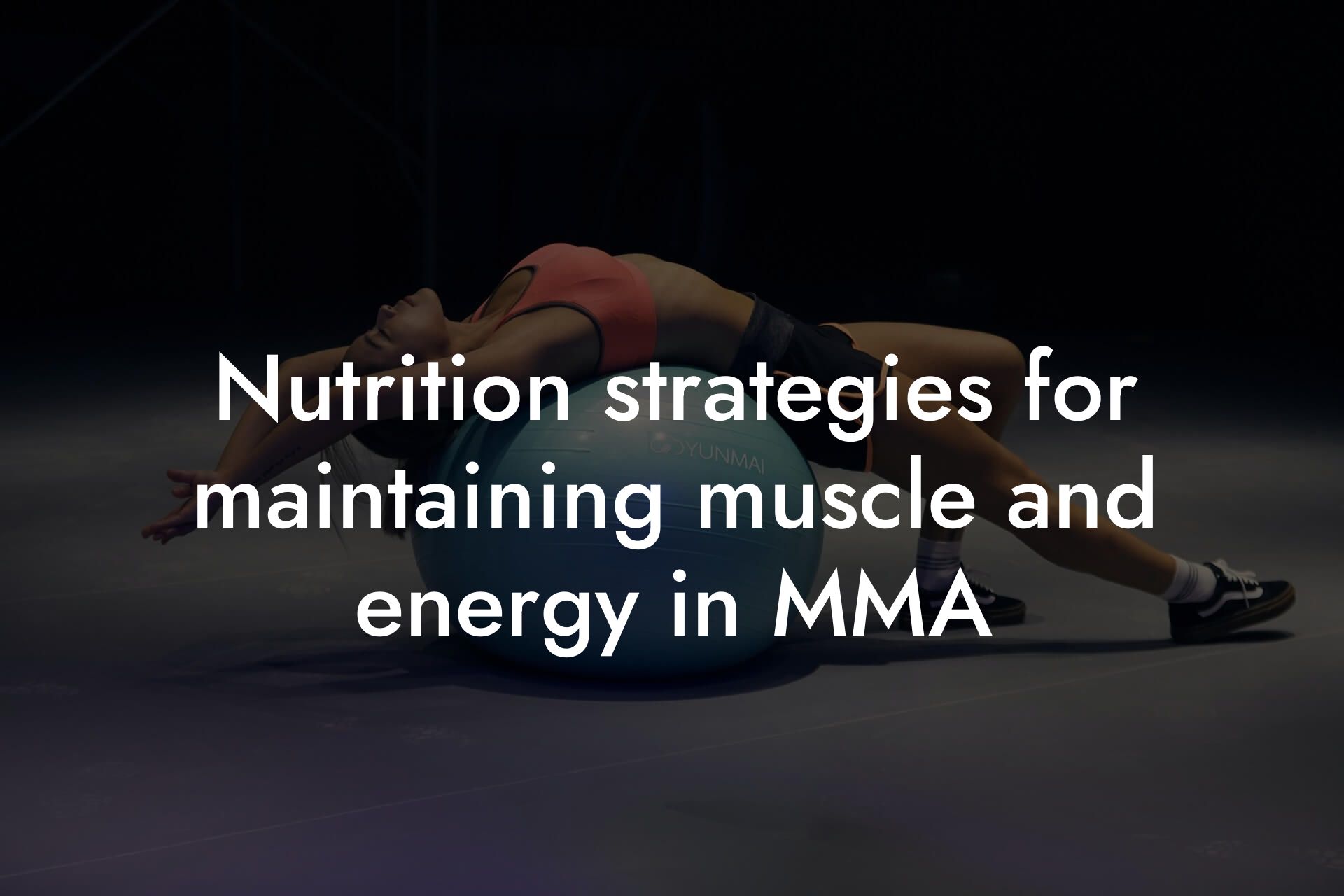As an MMA athlete, you understand the importance of optimizing your body composition to gain a competitive edge in the octagon. Body composition refers to the percentage of fat mass and lean mass in your body, which plays a critical role in determining your performance, endurance, and overall success in the sport. In this article, we will delve into the significance of body composition in MMA, its impact on performance, and how DEXA scanning can help you achieve your goals.
Table of Contents
- What is Body Composition?
- Why is Body Composition Important in MMA?
- The Impact of Body Composition on MMA Performance
- The Role of Muscle Mass in MMA Performance
- The Impact of Body Fat on MMA Performance
- How DEXA Scanning Can Help MMA Athletes
- Using DEXA Scanning to Track Progress and Achieve Goals
- Frequently Asked Questions
What is Body Composition?
Body composition is the proportion of fat mass and lean mass in your body. Fat mass includes essential fat, which is necessary for bodily functions, and storage fat, which is excess energy stored in adipose tissue. Lean mass, on the other hand, includes muscle mass, bone density, and water. A healthy body composition is characterized by a high percentage of lean mass and a low percentage of fat mass.
Why is Body Composition Important in MMA?
In MMA, body composition is crucial for several reasons. Firstly, a high percentage of lean mass provides the necessary strength, power, and endurance to perform at a high level. Secondly, a low percentage of fat mass enables athletes to move quickly and efficiently, making it easier to evade opponents and execute complex techniques. Finally, a healthy body composition reduces the risk of injury, as excess fat can put additional strain on joints and muscles.
The Impact of Body Composition on MMA Performance
Research has consistently shown that MMA athletes with a high percentage of lean mass and a low percentage of fat mass tend to perform better in competition. This is because lean mass provides the necessary strength, power, and endurance to sustain a high-intensity effort over a prolonged period. In contrast, excess fat mass can lead to decreased speed, agility, and endurance, making it more difficult to compete at a high level.
The Role of Muscle Mass in MMA Performance
Muscle mass is a critical component of lean mass, and it plays a vital role in MMA performance. A high percentage of muscle mass enables athletes to generate more power, speed, and strength, making it easier to execute complex techniques and overcome opponents. Additionally, muscle mass helps to improve bone density, reducing the risk of injury and improving overall durability.
The Impact of Body Fat on MMA Performance
Excess body fat can have a negative impact on MMA performance. Not only does it reduce speed, agility, and endurance, but it also increases the risk of injury. This is because excess fat can put additional strain on joints and muscles, making it more difficult to recover from training and competition. Furthermore, excess body fat can also impair cardiovascular function, reducing an athlete's ability to sustain a high-intensity effort over a prolonged period.
How DEXA Scanning Can Help MMA Athletes
DEXA (Dual-Energy X-ray Absorptiometry) scanning is a non-invasive, highly accurate method of measuring body composition. By using DEXA scanning, MMA athletes can gain a detailed understanding of their body composition, including their percentage of fat mass and lean mass. This information can be used to develop targeted training and nutrition programs, helping athletes to optimize their body composition and improve their performance.
Using DEXA Scanning to Track Progress and Achieve Goals
One of the key benefits of DEXA scanning is that it provides a precise and objective measure of body composition. By tracking changes in body composition over time, MMA athletes can monitor their progress, identify areas for improvement, and make data-driven decisions to optimize their training and nutrition programs. This can help athletes to achieve their goals, whether it's to improve their performance, increase their lean mass, or reduce their body fat percentage.
In conclusion, body composition plays a critical role in MMA performance. A high percentage of lean mass and a low percentage of fat mass are essential for optimal performance, and DEXA scanning provides a valuable tool for athletes to track their progress and achieve their goals. By understanding the importance of body composition and using DEXA scanning to guide their training and nutrition programs, MMA athletes can gain a competitive edge and achieve success in the octagon.
Frequently Asked Questions
What is body composition, and why is it important in MMA?
Body composition refers to the percentage of fat, lean mass, and bone density in the body. In MMA, body composition plays a crucial role in performance, as it affects strength, power, endurance, and overall athleticism. A well-balanced body composition can enhance a fighter's ability to perform at their best, while an imbalanced composition can lead to decreased performance and increased risk of injury.
How does body fat percentage affect MMA performance?
Excess body fat can negatively impact MMA performance by decreasing speed, agility, and endurance. High body fat percentage can also increase the risk of injury, as excess weight can put additional stress on joints and muscles. On the other hand, a low body fat percentage can improve performance by increasing power-to-weight ratio and enhancing overall athleticism.
What is the ideal body fat percentage for MMA fighters?
The ideal body fat percentage for MMA fighters varies depending on the individual and their specific goals. Generally, a body fat percentage between 6-12% is considered optimal for most male fighters, while 16-23% is considered optimal for most female fighters. However, it's essential to note that body fat percentage is just one aspect of overall body composition, and other factors such as lean mass and bone density should also be considered.
How does lean mass affect MMA performance?
Lean mass, which includes muscle mass and bone density, plays a critical role in MMA performance. A higher lean mass can increase strength, power, and endurance, allowing fighters to perform at a higher level. Additionally, lean mass can help to improve bone density, reducing the risk of injury.
What is the importance of bone density in MMA?
Bone density is a critical component of overall body composition, as it affects the strength and resilience of bones. In MMA, high bone density can help to reduce the risk of injury, particularly in high-impact activities such as striking and grappling. Additionally, high bone density can improve overall athletic performance by allowing fighters to generate more power and speed.
How can MMA fighters improve their body composition?
MMA fighters can improve their body composition through a combination of proper nutrition, training, and recovery. This includes consuming a balanced diet that is high in protein and low in processed foods, engaging in regular strength and conditioning training, and getting adequate rest and recovery. Additionally, fighters can work with a coach or nutritionist to develop a personalized plan tailored to their specific needs and goals.
What role does nutrition play in body composition for MMA fighters?
Nutrition plays a critical role in body composition for MMA fighters, as it provides the necessary fuel for training and recovery. A well-balanced diet that is high in protein, complex carbohydrates, and healthy fats can help to support muscle growth and repair, while also promoting fat loss and improving overall body composition.
How can MMA fighters optimize their macronutrient intake for improved body composition?
MMA fighters can optimize their macronutrient intake by consuming a balanced diet that includes the following: 1.5-2 grams of protein per kilogram of body weight, 2-3 grams of complex carbohydrates per kilogram of body weight, and 0.5-1 gram of healthy fats per kilogram of body weight. Additionally, fighters should aim to stay hydrated by drinking plenty of water throughout the day.
What is the importance of hydration in MMA?
Hydration is critical in MMA, as it affects physical performance and overall health. Proper hydration can help to improve endurance, strength, and power, while also reducing the risk of injury and improving recovery. MMA fighters should aim to drink at least 8-10 glasses of water per day, and should also consume electrolyte-rich beverages during and after training.
How can MMA fighters track their body composition?
MMA fighters can track their body composition through a variety of methods, including: skinfold measurements, bioelectrical impedance analysis (BIA), dual-energy X-ray absorptiometry (DXA), and hydrostatic weighing. Regular tracking of body composition can help fighters to monitor their progress, identify areas for improvement, and make data-driven decisions about their training and nutrition.
What is the importance of periodized training in MMA?
Periodized training is critical in MMA, as it allows fighters to vary their training intensity and volume over time. This can help to improve performance, reduce the risk of injury, and promote overall athletic development. Periodized training typically involves alternating between periods of high-intensity training and periods of low-intensity training, with regular deloads and rest periods.
How can MMA fighters incorporate strength training into their program?
MMA fighters can incorporate strength training into their program by focusing on exercises that improve functional strength, power, and endurance. This can include exercises such as squats, deadlifts, bench press, and rows, as well as plyometric exercises such as box jumps and depth jumps. Strength training should be periodized and tailored to the individual fighter's needs and goals.
What is the importance of conditioning in MMA?
Conditioning is critical in MMA, as it affects a fighter's ability to sustain a high level of intensity over time. Proper conditioning can help to improve cardiovascular endurance, increase muscular endurance, and enhance overall athletic performance. Conditioning exercises can include activities such as running, jumping rope, and bag work, as well as high-intensity interval training (HIIT).
How can MMA fighters incorporate conditioning into their program?
MMA fighters can incorporate conditioning into their program by focusing on exercises that improve cardiovascular endurance, muscular endurance, and anaerobic capacity. This can include activities such as running, jumping rope, and bag work, as well as high-intensity interval training (HIIT). Conditioning should be periodized and tailored to the individual fighter's needs and goals.
What is the importance of recovery in MMA?
Recovery is critical in MMA, as it affects a fighter's ability to train and perform at a high level. Proper recovery can help to reduce the risk of injury, improve physical performance, and enhance overall athletic development. Recovery techniques can include activities such as stretching, foam rolling, and active recovery, as well as proper nutrition and hydration.
How can MMA fighters optimize their recovery?
MMA fighters can optimize their recovery by focusing on proper nutrition, hydration, and sleep. This can include consuming a balanced diet that is high in protein and complex carbohydrates, staying hydrated by drinking plenty of water, and getting at least 7-9 hours of sleep per night. Additionally, fighters can incorporate recovery techniques such as stretching, foam rolling, and active recovery into their program.
What is the importance of mental preparation in MMA?
Mental preparation is critical in MMA, as it affects a fighter's ability to perform under pressure and overcome adversity. Proper mental preparation can help to improve confidence, focus, and overall athletic performance. Mental preparation techniques can include activities such as visualization, meditation, and positive self-talk.
How can MMA fighters incorporate mental preparation into their program?
MMA fighters can incorporate mental preparation into their program by focusing on techniques such as visualization, meditation, and positive self-talk. This can include activities such as visualizing success, meditating to reduce stress and anxiety, and engaging in positive self-talk to improve confidence and focus. Mental preparation should be periodized and tailored to the individual fighter's needs and goals.
What is the importance of coaching and guidance in MMA?
Coaching and guidance are critical in MMA, as they provide fighters with the necessary support and direction to achieve their goals. A good coach can help fighters to develop a personalized training plan, provide technical guidance, and offer emotional support and motivation. Fighters should seek out a coach who is experienced, knowledgeable, and supportive.
How can MMA fighters find a good coach or training program?
MMA fighters can find a good coach or training program by doing their research, asking for referrals, and seeking out programs that are reputable and experienced. Fighters should look for coaches who are knowledgeable, supportive, and experienced, and who can provide a personalized training plan that meets their individual needs and goals.
What is the importance of injury prevention in MMA?
Injury prevention is critical in MMA, as it affects a fighter's ability to train and perform at a high level. Proper injury prevention can help to reduce the risk of injury, improve physical performance, and enhance overall athletic development. Injury prevention techniques can include activities such as warm-up and cool-down exercises, stretching, and strengthening exercises.
How can MMA fighters prevent injuries?
MMA fighters can prevent injuries by focusing on proper training techniques, warming up and cooling down properly, and incorporating injury prevention exercises into their program. This can include activities such as stretching, strengthening exercises, and proprioception exercises. Fighters should also listen to their bodies and take regular breaks to rest and recover.
What is the importance of body composition analysis in MMA?
Body composition analysis is critical in MMA, as it provides fighters with valuable information about their body fat percentage, lean mass, and bone density. This information can be used to develop a personalized training plan, track progress, and make data-driven decisions about nutrition and training.
How can MMA fighters use body composition analysis to improve their performance?
MMA fighters can use body composition analysis to improve their performance by tracking their progress, identifying areas for improvement, and making data-driven decisions about their training and nutrition. This can include using body composition analysis to monitor changes in body fat percentage, lean mass, and bone density, and adjusting their training and nutrition plan accordingly.
Here are some related articles you might love...
- Reducing body fat for optimal weight class in MMA
- Nutrition strategies for maintaining muscle and energy in MMA
- Strength and conditioning programs for MMA fighters
- Off-season training and conditioning for MMA fighters
- The role of DEXA scans in MMA training and weight management
- The importance of lean muscle mass in MMA performance
- Recovery techniques for MMA athletes after fights
- Balancing power, speed, and agility in MMA training
- Bone density and injury prevention in MMA
Zak Faulkner
Zak Faulkner is a leading authority in the realm of physical health and body composition analysis, with over 15 years of experience helping professionals optimise their fitness and well-being. As one the experts behind Tano Performance Group, Zak has dedicated his career to providing in-depth, science-backed insights that empower clients to elevate their physical performance and overall health.
With extensive knowledge of DEXA technology, Zak specializes in delivering comprehensive body assessments that offer precise data on body fat, muscle mass, bone density, and overall physique. His expertise enables individuals to make informed decisions and achieve their fitness goals with accuracy and confidence. Zak’s approach is rooted in a deep understanding of human physiology, combined with a passion for helping clients unlock their full potential through personalised strategies.
Over the years, Zak has earned a reputation for his commitment to excellence, precision, and client-focused service. His guidance is trusted by top professionals who demand the best when it comes to their health. Whether advising on fitness programs, nutritional strategies, or long-term wellness plans, Zak Faulkner’s insights are a valuable resource for anyone serious about taking their health and fitness to the next level.
At Tano Performance Group, Zak continues to lead our Content Team revolutionising how professionals approach their physical health, offering unparalleled expertise that drives real results.




